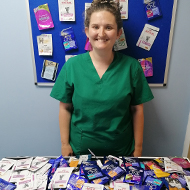
Lucy Rose-Smith hopes to prevent thousands of pouches going to landfill.
A feline-only veterinary practice in Sunderland has launched an innovative scheme to prevent thousands of cat food pouches from ending up in landfill.
SimplyCats Vet Clinic has joined the TerraCycle recycling scheme, which it hopes will turn its team's annual waste – amounting to some 4,300 plastic food pouches - into the production of different plastic products, including fence posts and benches.
The campaign is the brainchild of RVN Lucy Rose-Smith, who was struck by the amount of pet food packaging going to waste in her practice. Instead of sending the pouches to landfill, Lucy decided to set up one of the first TerraCycle collection points in the North East of England.
“Our team absolutely love cats and between us, we have 16, but until recently it had never really struck me how much of our pet food packaging goes to landfill,” Lucy commented. “I’m conscious that we need to look after our environment, and at SimplyCats Vet Clinic we always strive to limit our carbon footprint. By making some simple changes, we can all make a difference.
“Our team members have more than the usual number of pet cats, but I counted the amount of pet food packaging we get through at home and our cats consume 84 wet-food packets in a week – that’s a whopping 4,368 each year!”
With the support of her colleagues, Lucy’s pet food pouch-collection station is now up and running, and cat owners in the area can drop off their rinsed and dried packaging to be sent for recycling. In the first week of launching the campaign alone, the team amassed a kilo of cat food pouches.
“Cats provide wonderful companionship, but the amount of waste going to landfill from their food is shocking. We had to act to give cat owners a more sustainable choice,” said Lucy. "We’re now regularly delivering large volumes of used pouches to TerraCycle where they are processed and made into a wide range of new plastic goods.”
Image (C) SimplyCats Vet Clinic.



 The latest
The latest